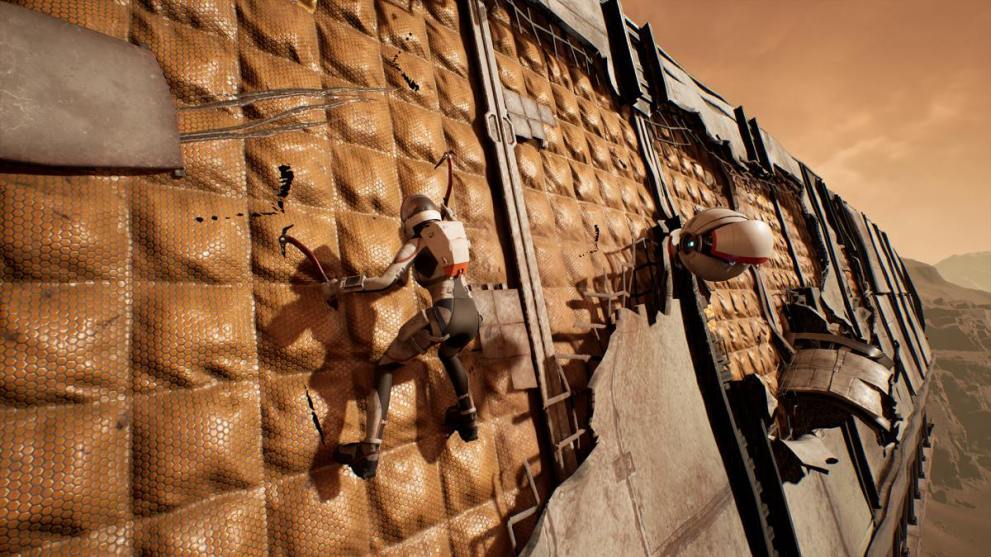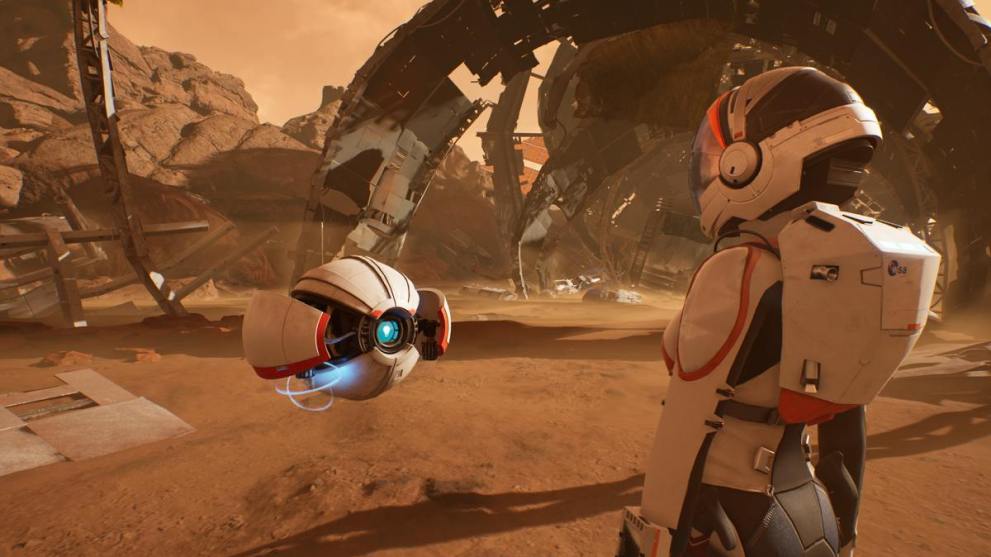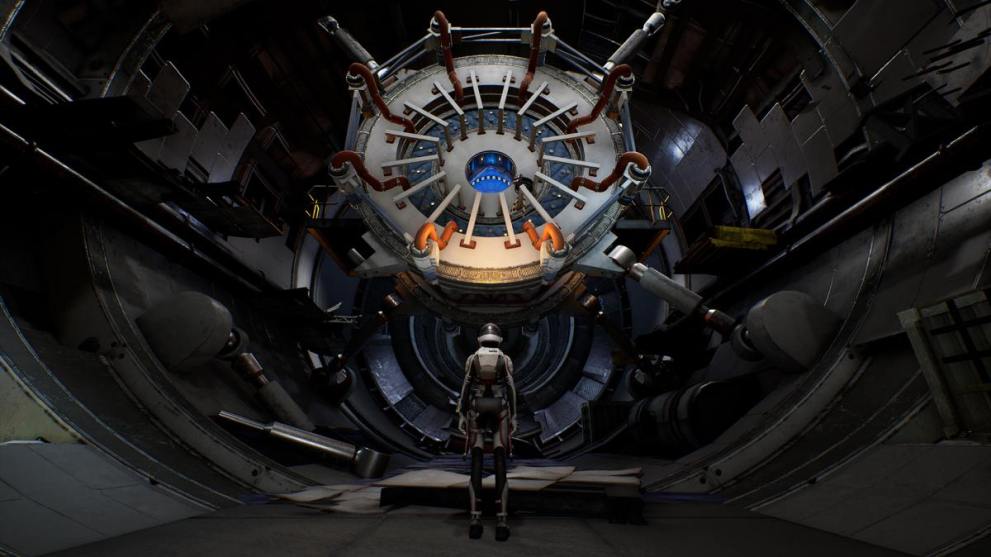Deliver Us Mars by KeokeN Interactive and Frontier Foundry is getting close to its release, and it certainly looks like a promising stab at the sci-fi narrative adventure genre. Both the first demo I tried at Gamescom, and the second I enjoyed a few days ago during a dedicated preview event left me wanting more.
The game’s climbing and puzzle mechanics are interesting, albeit they appear to appease more patient gamers, and they’re topped by a very intriguing story. To know more about this game, Twinfinite interviewed Koen Deetman, Game Director at KeokeN Interactive.
Giuseppe: With multiple press demos under your belt, is there anything interesting you’ve learned from the feedback and plan to address?
Koen Deetman: With narrative-driven single-player experiences, it’s always a mix of a multitude of things that go well and things you’d like to keep working on forever. Player feedback is greatly appreciated, especially when we actually get to observe those players in action. Verbal feedback is sometimes very polite, but players’ actions tend to speak louder than words.
As an example of something positive we’ve learned, most players found it refreshing that Deliver Us Mars is not constantly spoon-feeding the player solutions or objectives throughout the game. We’ve been careful in how we’ve designed this: giving the player the freedom to explore and figure things out for themselves while also offering prompts for those who might need them. It’s a careful balancing act, but the goal is to create the most rewarding experience possible for all players.
Giuseppe: The latest demo included driving a surface vehicle. Is that a prominent part of gameplay or
an occasional diversion?
Koen Deetman: Let’s say it’s a little more frequent than what players have experienced in the game’s
predecessor, Deliver Us The Moon. In Deliver Us Mars, driving the rover has been integrated into the core experience of traversing the landscapes – they underline the sense of scale in the space you’re exploring. In a logical sense, too, they honor the grounded approach to sci-fi we have in the game. Players will have a few opportunities to drive them across Deliver Us Mars.

Giuseppe: The puzzles based on beams and reflectors are interesting, but are there different kinds of
puzzles that we haven’t seen yet?
Koen Deetman: In Deliver Us The Moon, the puzzles were mostly designed as one-offs, meaning they weren’t scalable – you solved them once and then moved on. In Deliver Us Mars, we’ve crafted a whole
system and set of tools for the player to play around with in solving the puzzles, and we can deploy in different ways as designers.
This means we can create a skill curve we weren’t able to offer in Deliver Us The Moon, as well as integrate the puzzles with other mechanics, like platforming, climbing, or using AYLA, your ASE companion. It’s the combinations of those different gameplay types and the twists the different reflectors, dampeners, and splitters add to the puzzles that make them feel new and refreshing across the game.
Giuseppe: Don’t get me wrong, as I enjoy it, but have you been considering a mode to make climbing
simpler or even automatic for those who just want to enjoy the story?
Koen Deetman: As we don’t have very simple combat or conflict/resolution mechanics in Deliver Us Mars, there was an ambition for us to have a ‘real thrill’ mechanic in the game that didn’t involve timers or countdowns. After seeing the documentary Free Solo, the real danger of ‘hold on or else…’ was such a powerful feeling, and we really wanted to bring it into Deliver Us Mars.
We have definitely considered different versions of the climbing, but the difficulty does serve a purpose other than being challenging in certain moments. It underlines the sense of realism we want to bring into our sci-fi game, the sense of drama you’d actually feel from ascending or descending the cliffs of a mountain.
The key thing, too, is that no single mechanic really dominates in Deliver Us Mars – it’s not a whole game of climbing, and it’s not a whole game of solving puzzles. It’s a whole mix of gameplay elements that exist to support the narrative, and they may change depending on the setting of a particular chapter.

Giuseppe: With the new demo I just tried, the story is getting quite dark. Just how dark can we expect it to go?
Koen Deetman: It will get darker, but not in places players might expect. I think this game will truly pull on your heartstrings. It’s a dramatic story that grounds itself in humanity – it’s a relatable story with real-feeling characters, and it poses questions without easy answers. We can’t wait to see what players will think after they’ve played the game.
Giuseppe: Something I find rather interesting is that the holograms providing a window into the past
are just silhouettes. Was it an intentional choice to make the narration feel darker and more unsettling?
Koen Deetman: The holograms are inherited from Deliver Us The Moon, which were our method to tell the story in retrospect as players explored areas that were once inhabited. In Deliver Us Mars, they are especially haunting, as we put more work into the environments they take place in.
You’ll find locations that are left in a certain state and wonder why that’s the case – and maybe the holograms will shed some light on what’s happened, without giving you the whole story. They also allow Kathy to learn what happened to her father as part of the Outward group, giving her these personal moments of reconciliation.

Giuseppe: With Mars often in the headlines as it’s seen as the next step in human exploration of space,
what kind of research did you do for the game?
Koen Deetman: We’ve spoken to a number of people with relevant backgrounds in researching the game,
including former astronauts and planetary geologists. Besides that, a lot of research from real-world sources went into creating the grounded setting of Deliver Us Mars, in terms of story details, the state of the Earth in this alternate future setting, and even our technology, like the MPT (Microwave Power Transmission) sources found in the game.
Certainly, too, we wanted to depict the challenges of actually living on Mars – the story of the Outward colonists explores that in real detail.
Giuseppe: Is there any more insight you’d like to share with our readers?
Koen Deetman: Deliver Us Mars is a story-driven experience that explores difficult themes through a
personal lens, while pacing its gameplay and puzzles carefully to support that larger narrative. It’s the combination of those elements that make Deliver Us Mars unique, and I hope after players finish the game, they will feel they had a lasting experience that made them think about the important questions facing humanity now.
Delivers us Mars releases February 2, 2023, for PlayStation 5, PlayStation 4, Xbox One, Xbox Series X|S, and PC.
